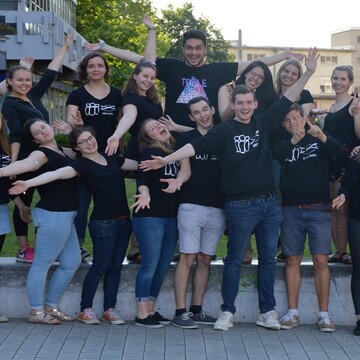Sociology as a Minor
The program managers will be at your disposal during the entire program. Please do not hesitate to contact them if you have any subject-specific questions on structuring your minor or spending a period of study abroad. On the following pages, you will find additional useful information on your minor (examination regulations, module catalogs and degree plans as well as events and news at the Department of Sociology).
Please note: the minor in Sociology is taught in German, so the documents listed on this page are only available in German.
What is Sociology?
Sociology at the University of Mannheim
In teaching and research, each university has its own unique profile that sets them apart from one another. That is why deciding which higher education institution you would like to go to matters for your future career.In Mannheim, research and teaching activity at the Department of Sociology is primarily geared towards European societies. Our courses look at specific subfields of sociology relating to work and employment, education, family, migration, organization, the economy, or social classes. One of the special features of the Sociology program at the University of Mannheim is the fact that it includes Social Psychology. In these modules, students are introduced to the social self-concept, group processes, attitudes and attitude change, and stereotypes, and learn to better understand them. In addition, the Department of Sociology has earned an international reputation for its strong focus on empirical-analytical research using quantitative methods, such as computer-assisted data analysis. That is why we offer special courses that allow you to practice carrying out your own research projects.
Math skills
Statistics courses are an integral part of the bachelor’s program in Sociology. Using statistical formulas, you test the validity of your hypotheses and calculate social interdependences and influencing factors. Don’t worry, though: you do not have to be a mathematical genius to do well in Statistics during this program.English skills
Much of the sociological literature is written in English. You should therefore be able to understand English texts. However, you do not need to speak English fluently.Usually, term papers are written in German. Some seminars may be offered in English, requiring you to hold your presentations and write your term papers in English. In most cases, participation in these seminars is voluntary.
What is Sociology not?
Working with people
People often falsely assume that by studying Sociology they will be trained to become a social pedagogue and be qualified to provide social care after graduation, e.g., in kindergartens, homes for children and young people, or institutions that provide counseling to addicts or assist disabled people. If you are interested in this kind of work, a program in Social Pedagogy or Social Work will be the right fit for you. Studying Sociology is therefore not the same as studying Social Pedagogy or Social Work. By pursuing a degree in Sociology, you will neither learn how to work with disabled people nor acquire pedagogical skills.Educational Science
Sociology does not deal with child rearing and different parenting styles either. These topics are covered by programs in Educational Science.Principles of psychological counseling
As a student of Sociology, you will not learn how to provide people with psychological counseling, as this falls within the area of Social Pedagogy or Psychology, too.Developmental Psychology
Developmental Psychology is covered by the Psychology program and, in this form, is not part of the Sociology program’s curriculum.
Important documents
For students at the School of Social Sciences
Bachelor’s program in Political Science:
Examination regulations for students whose program started in the 2015 fall semester (PDF, 31 kB)Bachelor’s program in Psychology:
Minor in Sociology for students whose program started in the 2015 fall semester (PDF, 2 MB)For students at the School of Humanities
Students who do not have Sociology as their core subject can choose Sociology as a minor. In the minor, students will obtain a total of 35 ECTS credits and they must take two modules:
- The basic module „Soziologie – Beifach” (Sociology – Minor)
- The advanced module „Allgemeine und Spezielle Soziologie – Beifach” (General and Specific Sociology – Minor) or the advanced module „Europäische Gesellschaften – Beifach” (Comparative European Societies – Minor)
- If you would like to replace the interdisciplinary module in Cultural Studies with an additional module in your minor or if you need to obtain more than 35 ECTS credits in your minor, you can take additional courses. You can either opt to take the entire advanced module you did not take or pick a lecture from the advanced module you did not take.
Examination regulations for students whose program started in the 2015 fall semester (PDF, 31 kB)
For students at the Business School
For students at the School of Law and Economics
Bachelor’s program in Economics:
Examination regulations for students whose program started in the 2015 fall semester (PDF, 31 kB)Master’s program in Economics
Elective modules in Sociology (“export modules”) (PDF, 383 kB)
Important information on your studies
Registration for courses and exams
There may be different periods to register for courses. Please regularly check the School’s website for up-to-date information. Usually, the respective program managers will also inform you about the registration periods for the courses in your core subject and the supplementary modules by e-mail. An additional registration period may apply to your minor, depending on the subject you choose.
You need to register for courses during the semester break between the fall and the spring semester. You can select your courses for the fall semester from early to mid-August and your courses for the spring semester in January/
February. Registration is done via Portal².
Each semester, you need to register online for those examinations you would like to take at the end of the lecture period. You will need to do so within a period defined by Student Services.
Please note: The exam registration period falls within the lecture period, which means that you cannot register for your examinations via the Student Services’ campus management system before the lecture period starts.
Each semester, the periods during which you can register for exams will be published on the Student Services’ website.
Online registration is done via Portal².Changing your minor
Usually, first-year students can select their minor for the fall semester in August and for the spring semester in January. Student Services will inform you about the relevant procedures about four weeks before the selection period begins. You can change your minor again after your first or second semester. Please contact Student Services for further information.
Recognition of credits obtained abroad
If you have the opportunity to take courses in other subjects abroad, it is also possible to have courses recognized for your minor. The decision on the recognition of courses for the minor lies with the respective departmental exchange coordinator or with the teacher. Please inquire about the respective regulations at the school in question.
Specific regulations for Sociology/
Political Science: - ZfS courses: Courses on cultural studies and language courses may also be recognized. Language courses are recognized by the departmental exchange coordinators. Courses on cultural studies and other courses have to be approved by the Center for Development of Key Competencies (ZfS) .
Psychology
- The recognition of applied subjects can also take place, for example, by attending courses in Business Administration, which can be recognized for Work and Organizational Psychology or Consumer Psychology.
Portal² – your campus management system
Portal² is the University of Mannheim’s campus management system. Using the portal, you can, for example, view the course catalog, create a course schedule, and register for examinations.
Academic advising
Do you have any more questions? We’re happy to advise you!
Please do not hesitate to contact the program manager for Sociology, who will be at your disposal as long as you take courses in your minor, if you have any subject-specific questions on structuring your minor or on the recognition of credits obtained abroad.

Dr. Claudia Eckhardt-Kamps (she/her)
School of Social Sciences
A 5, 6
Building A – Room A 417
68159 Mannheim
Please note: Only online consultations are offered currently. Please make an appointment at https://www.sowi.uni-mannheim.de/online-beratung/claudia-eckhardt-kamps/
Student Services office II
Pascal Vogel
B.A./M.A. Culture and Economy: PhilosophyUniversity of Mannheim
Division II – Student Affairs
Student Services II
L 1, 1 – Room 122
68161 MannheimConsultation hour(s):
Consultation hours every Tuesday from 9 a.m. to 11 a.m.
In addition, for individual consultations please book your appointment using the following form: https://www.uni-mannheim.de/index.php?id=16224.Advising for international students
 Credit: Katrin Glückler
Credit: Katrin GlücklerSolrun Graham-Parker (she/her)
Advisor Study Success International Degree-Seeking Students, Coordinator Made in Mannheim – FIT for StudiesUniversity of Mannheim
Division II – Student Affairs
International Office
L 1, 1 – Room 108
68161 MannheimConsultation hour(s):
Book an appointment for an individual consultation:
https://www.uni-mannheim.de/en/about/centers-institutions-affiliates-and-partners/international-office/consultation-hours-international-degree-seeking-students/Office hours:
Visit my office without an appointment on Tuesdays from 9–11 a.m. (open office hours). Credit: Tsvetina Tsonkova
Credit: Tsvetina TsonkovaAngela Dörflinger (she/her)
Team Lead International Degree Seeking StudentsUniversity of Mannheim
Division II – Student Affairs
International Office
L 1, 1 – Room 108
68161 MannheimConsultation hour(s):
Book an appointment for an individual consultation:
https://www.uni-mannheim.de/en/about/centers-institutions-affiliates-and-partners/international-office/consultation-hours-international-degree-seeking-students/Office hours:
Visit my office without an appointment on Tuesdays from 9–11 a.m. (open office hours).Departmental student committee

Departmental Student Committee for Sociology and Political Science
University of Mannheim
Departmental Student Committee for Sociology and Political Science
A 5, 6
Building B – Room B012
68159 MannheimConsultation hour(s):
By appointment
Open consultation hours on Tue, 7 p.m.

